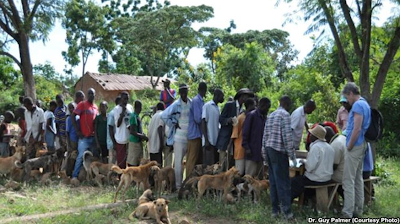 There are many global animal health issues, but one that
begs for the attention to any pet owner relates to dogs and rabies. Herein the US, we have become so accustomed
to pet ownership being associated with rabies vaccination, that we no longer
remember a time when it was not. Rabies
is a virus which attacks the nervous system and is 100% fatal. In the past century, human deaths associated
with rabies in the US have declined from 100 deaths per year to only 2-3 per
year. This has been largely attributed
to vaccination programs and animal controls established in the 1940’s, oral
vaccinations introduced in the 2000’s, and the development of human rabies vaccines
and immunoglobulins to prevent infection.
In this country we can safely say that the domestic dog is no longer a
reservoir for this disease. [1]
There are many global animal health issues, but one that
begs for the attention to any pet owner relates to dogs and rabies. Herein the US, we have become so accustomed
to pet ownership being associated with rabies vaccination, that we no longer
remember a time when it was not. Rabies
is a virus which attacks the nervous system and is 100% fatal. In the past century, human deaths associated
with rabies in the US have declined from 100 deaths per year to only 2-3 per
year. This has been largely attributed
to vaccination programs and animal controls established in the 1940’s, oral
vaccinations introduced in the 2000’s, and the development of human rabies vaccines
and immunoglobulins to prevent infection.
In this country we can safely say that the domestic dog is no longer a
reservoir for this disease. [1]
In other parts of the world, particularly South Asia and sub-Saharan Africa, people, and dogs, are not so lucky. It is reported that there are 50,000-60,000 deaths per year attributed globally to rabies, most occurring in these two regions. Many of these deaths are young boys, because they are often the care givers of the domesticated dogs, and will get bitten on the head or face where the virus can spread quickly to the central nervous system before human vaccines can be administered. Dr. Guy Palmer, and a group of veterinarians working at Washington State University have begun a new program called the Paul G. Allen School for Global Animal Health. One of their projects currently is to make rabies vaccination of domesticated dogs available, and sustainable, in these communities. Their research has shown that if we can vaccinate just 60% of the domesticated dog population, we can essentially eliminate rabies outbreaks in a community. And if we can move outward from a controlled population, we can widen the area of control quickly and efficiently. The surprise to researchers has been the willingness and eagerness with which the human guardians of these dogs line up for vaccinations. The will is clearly present.
But the cost for vaccination programs is reliant on donor support. The hope is to develop more heat tolerant vaccines (keeping vaccines cool adds nearly $1/vaccine to the cost), and minimize transportation costs by being able to store vaccines on site. These changes will markedly reduce costs and allow programs to become self-sustaining in the future.[2] Their research efforts, as well as vaccination programs, are helping to change the course of this devastating disease, while strengthening the bond between canines and humans.
Please join us in supporting their efforts this year. This is a program with tangible results that will save both human and animal lives. You can make a donation the next time you are in our hospital, or online at http://globalhealth.wsu.edu/giving/index.html.
Thank you for taking time to consider how we at home, can still make a difference, and make the planet safer for people and their dogs. Happy Holidays!

No comments:
Post a Comment